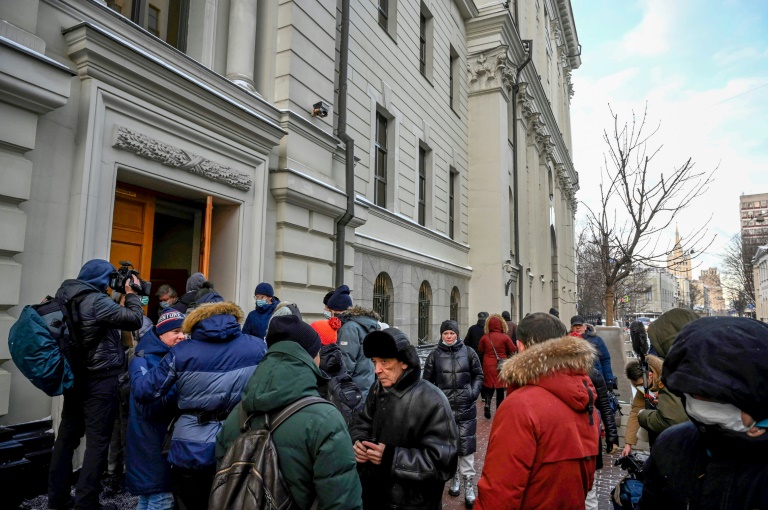Russia’s Supreme Court on Tuesday heard a request to shut down Memorial, the country’s most prominent rights group and chronicler of Stalin-era purges and contemporary political persecutions.
The organisation, founded in 1989 by Soviet dissidents including Nobel Peace Prize laureate Andrei Sakharov, believes it will become a victim of the repression it was founded to keep at bay by the end of the week.
As the hearing kicked off, several dozen supporters gathered outside the Moscow courthouse in freezing temperatures.
Stationed nearby were two police vans and several officers, who detained three people, an AFP correspondent at the scene said.
“We need to know our history, to understand well what is happening.
Memorial tells the truth, in no way does it denigrate the country,” supporter Maria Biryukova told AFP.
The move against Memorial comes at the end of a year that has seen authorities dismantle the political opposition and crack down on independent media and rights groups.
Prosecutors say the group’s central structure, Memorial International, breaches its designation as a “foreign agent” by not marking all its publications, including social media posts, with the label as required by law.
The legislation, which carries Stalin-era connotations, brands organisations receiving foreign funds as acting against Russia’s interests.
Memorial’s lawyers and founders have denied any serious violations, saying its material was properly marked and that only an insignificant number of documents may have been missing the tag.
Tuesday’s hearing is one of two cases brought against the group and is being heard by the Supreme Court because Memorial International is registered as an international body.
The ruling will not be open to appeal in a Russian court.
Prosecutors have also demanded a court close Memorial’s Human Rights Centre, accusing it of condoning “terrorism and extremism” in addition to breaches of the “foreign agent” legislation.
A Moscow court will hold a new hearing in that case on Wednesday.
– Denounced by Putin –
On Monday, a court in the northwestern city of Petrozavodsk increased a prison sentence for the head of Memorial in Karelia, Yury Dmitriyev, to a total of 15 years.
His supporters say he is being punished for his work locating and exhuming mass graves of people killed under Soviet dictator Joseph Stalin’s rule.
Sentenced last year to 13 years in prison on what his supporters say were fabricated child sex charges, the 65-year-old will now spend two additional years in prison.
Memorial is a loose structure of locally registered organisations, with Memorial International maintaining the network’s extensive archives in Moscow and coordinating its work.
The group has spent years cataloguing atrocities committed in the Soviet Union, especially in the notorious network of prison camps, the Gulag.
Memorial has also campaigned for the rights of political prisoners, migrants and other marginalised groups, and highlighted abuses especially in the turbulent North Caucasus region that includes Chechnya.
Supporters say its closure would signal the end of an era in Russia’s post-Soviet democratisation process, which began 30 years ago this month.
The group itself is not holding out much hope that the courts will rule in its favour, with President Vladimir Putin saying this month that Memorial had been advocating on behalf of “terrorist and extremist organisations”.
The latest hearing in the trials comes after Russia blocked the website of the OVD-Info rights monitor, which works with Memorial, on the weekend saying it promoted terrorism and extremism.
OVD-Info has tracked opposition protests and provided legal support to victims of political persecution, while Memorial has compiled a list of political prisoners that includes Putin’s main domestic opponent Alexei Navalny.
Navalny was jailed in February on old fraud charges and has since seen his organisations banned as “extremist” and all of his top allies flee the country.
rco-afptv-emg/jxb











